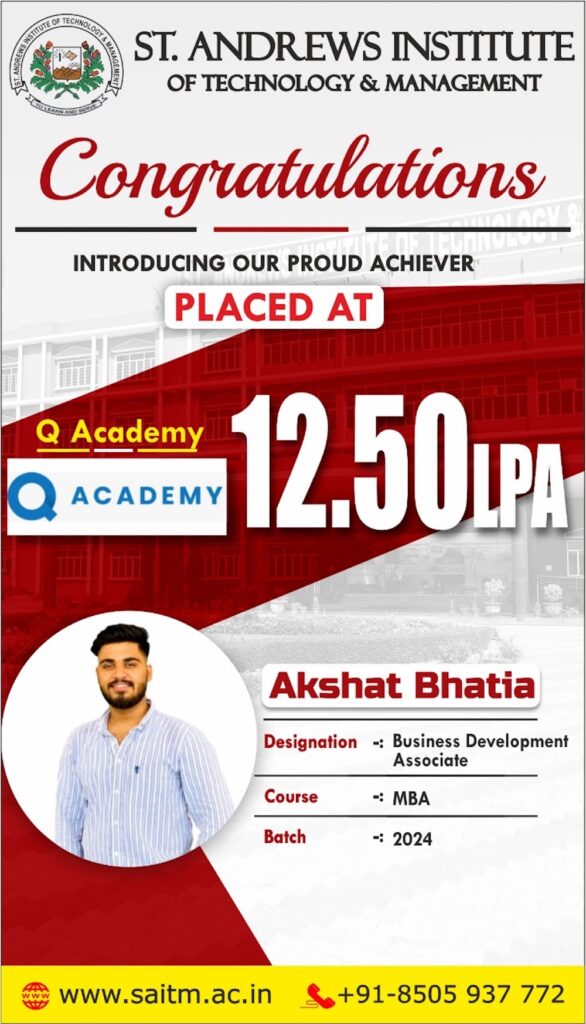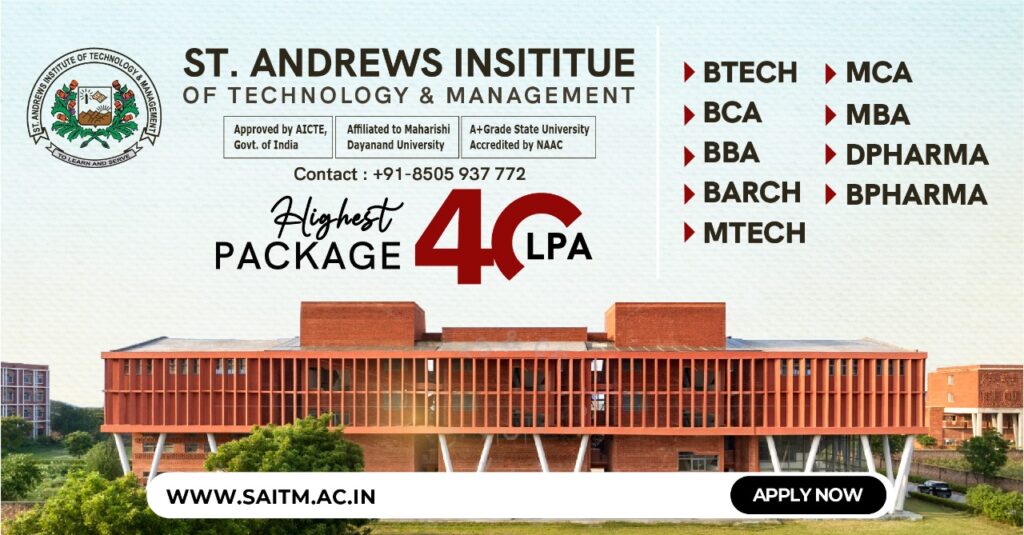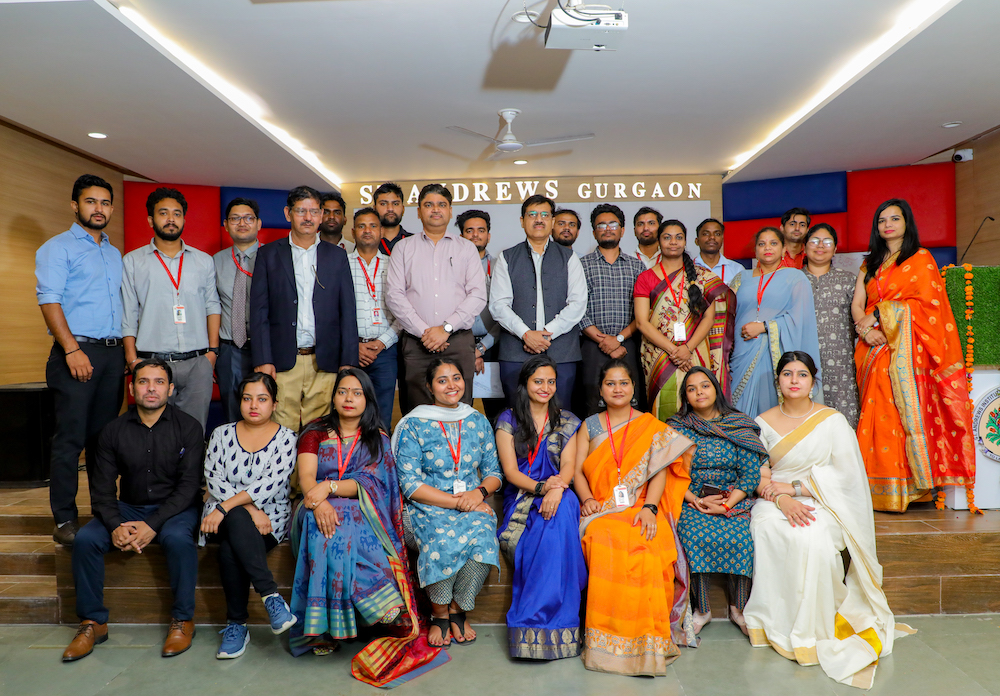MBA kitne saal ka hota hai

MBA kitne saal ka hota hai? Typically, MBA (Master of Business Administration) ka course do saal ka hota hai. Ye postgraduate level ka program hai jo business management, planning, aur financial handling jaise aspects ko cover karta hai. Kuch universities aur institutions short-term ya part-time MBA courses bhi offer karte hain. Jo ek saal ka hota hai ya phir flexible schedule ke saath aata hai.
Some of the most opted courses in India and St. Andrews college or different Engineering college or Management colleges are as follows:-
- Btech
- Btech CSE
- Btech ETCE
- MTech
- BCA
- BBA
- MBA
- MCA
- DPharma – St. Andrews College of Pharmacy
- BPharma – St. Andrews College of Pharmacy
- BArch – St. Andrews College of Architecture
Full Form of MBA

MBA stands for Master of Business Administration. It’s a postgraduate degree program that equips students with advanced skills and knowledge in various aspects of business management.
It covers subjects such as finance, marketing, operations, human resources, and strategic management. MBA kitne saal ka hota hai. Through a blend of theoretical learning and practical applications, MBA courses aim to develop individuals’ leadership, analytical, and decision-making abilities.
Graduates of MBA courses often pursue careers in a wide range of industries, including finance, consulting, technology, healthcare, and entrepreneurship.
The MBA course is highly esteemed in the business realm. It can unlock pathways to varied career opportunities, leadership positions, and increased earning potential.
MBA Course Details

An MBA, or Master of Business Administration, represents a postgraduate degree program emphasizing diverse facets of business administration. The curriculum commonly encompasses a broad spectrum of subjects, encompassing finance, marketing, operations, human resources, strategy, entrepreneurship, and beyond.
Here are some common details about MBA courses:
Duration of MBA Program
MBA programs typically last for two years if pursued full-time. However, there are also part-time and executive MBA courses which may have different durations.
Core Courses
These fundamental courses encompass critical areas of business, including accounting, finance, marketing, logistics management, organizational behavior, and strategic management.
Elective Courses
Students enrolled in management colleges often have the flexibility to select elective courses according to their interests and career objectives. These electives encompass specialized subjects such as international trade, healthcare management, sustainable business practices, technology management, and more.
Internship/Practicum
Many MBA programs require students to complete internships or practical projects. This allows them to gain real-world experience and apply classroom learning in a professional setting.
Capstone Project
Towards the end of the program, students may be required to complete a capstone project. This involves working on a real business problem or developing a comprehensive business plan.
Specializations/Concentrations
Some MBA courses offer specializations or concentrations that allow students to delve deeper into specific areas of business. Common specializations include finance, marketing, entrepreneurship, logistics management and more.
Global Perspective
With the increasing globalization of business, many MBA courses emphasize international trade perspectives. They offer courses or opportunities for international study trips, exchanges, or projects.
Networking Opportunities
MBA courses often provide ample opportunities for networking with classmates, alumni, industry professionals, and recruiters through events, clubs, conferences, and career services.
Admissions Requirements
Admission to MBA courses typically requires a bachelor’s degree from an accredited institution, satisfactory MAT or CAT scores, relevant work experience (though not always required), letters of recommendation, and a statement of purpose or essays.
Cost
MBA courses can vary significantly in cost depending on factors such as location, reputation, and duration. Financial aid, scholarships, and assistantships may be available to help offset expenses.
Accreditation
It’s important to ensure that the MBA degree you’re considering is accredited by a recognized accrediting body. Accreditation ensures that the program meets certain standards of quality and rigor.
Career Opportunities
MBA graduates pursue various career paths including roles in management consulting, finance, marketing, entrepreneurship, logistical management, and other fields such as marketing professional positions. Many MBA courses offer career services to assist students in their job search and career advancement.
Future Scope of MBA Degree

The future scope of an MBA degree remains promising and diverse. Here are several reasons why:
Global Opportunities
As the demand for professionals with expertise in global markets, international business practices, and cross-cultural management skills grows due to expanding businesses worldwide, there’s an increasing need for individuals to pursue MBA. This degree equips them with the necessary tools to navigate and excel in the globalized business environment.
Specialization
MBA courses offer various specializations such as finance, marketing, operations, entrepreneurship, healthcare management, and more. This allows individuals to tailor their education to align with their career interests and capitalize on emerging industry trends.
Leadership Development
Leadership skills are essential across all industries. MBA courses often focus on developing leadership qualities such as strategic thinking, decision-making, communication, and team management, which are highly valued by employers.
Entrepreneurship
Many MBA graduates venture into entrepreneurship and start their own businesses, leveraging the entrepreneurial skills acquired during an MBA program, including business planning, innovation, and risk management. MBA kitne saal ka hota hai.
Networking Opportunities:
MBA courses provide extensive networking opportunities with classmates, alumni, faculty, and industry professionals. Building a strong professional network can open doors to new career opportunities, partnerships, and mentorship.
Higher Earning Potential
On average, MBA graduates tend to earn higher salaries compared to those with only undergraduate degrees. The advanced skills, knowledge, and leadership capabilities acquired through an MBA degree often translate into greater earning potential over the course of one’s career, especially in business production operations.
Adaptability
The business landscape is continually changing due to technological advancements, economic shifts, and alterations in consumer behavior, making it imperative for those in the MBA programme to stay adaptable and informed. Individuals holding an MBA degree are trained to adapt to these changes, think critically, and innovate, making them valuable assets to organizations across industries.
Executive Roles
MBA degree holders are well-positioned to assume executive and senior management roles within organizations. These positions come with increased responsibilities, influence, and opportunities to shape organizational strategies and initiatives.
MBA Specialisation

MBA specialisations allow students to focus their studies on a particular area of business, preparing them for specific career paths.
Here are some popular MBA specializations along with their career prospects:
Finance
Career Prospects: Financial Analyst, Investment Banker, Portfolio Manager, Risk Manager, Corporate Treasurer.
Job Opportunities: Banks, Investment Firms, Financial Consulting Firms, Corporate Finance Departments.
Skills Developed: Financial Analysis, Investment Management, Risk Assessment, Corporate Finance.
Marketing
Career Prospects: Marketing Manager, Brand Manager, Market Research Analyst, Digital Marketing Manager, Product Manager.
Job Opportunities: Consumer Goods Companies, Advertising Agencies, Market Research Firms, Digital Marketing Agencies.
Skills Developed: Market Research, Brand Management, Advertising, Digital Marketing, Product Development.
Human Resources (HR)

Career Prospects: HR Manager, Talent Acquisition Specialist, Training and Development Manager, Compensation and Benefits Manager.
Job Opportunities: Corporations, Consulting Firms, Recruitment Agencies, HR Technology Companies.
Skills Developed: Employee Relations, Recruitment, Training and Development, Performance Management.
Operations Management
Career Prospects: Operations Manager, Supply Chain Manager, Logistics Manager, Quality Control Manager, Project Manager.
Job Opportunities: Manufacturing Companies, Retailers, Logistics Companies, Consulting Firms.
Skills Developed: Supply Chain Management, Process Improvement, Project Management, Quality Control.
Entrepreneurship:

Career Prospects: Startup Founder, Business Development Manager, Venture Capitalist, Innovation Manager.
Job Opportunities: Startups, Incubators, Venture Capital Firms, Corporate Innovation Departments.
Skills Developed: Business Planning, Entrepreneurial Finance, Innovation Management, Startup Operations.
Information Technology (IT) Management:
Career Prospects: IT Manager, Systems Analyst, IT Consultant, Chief Technology Officer (CTO).
Job Opportunities: Technology Companies, Consulting Firms, Financial Institutions, Healthcare Organizations.
Skills Developed: IT Strategy, Project Management, Information Security, Data Analytics.
International Business:
Career Prospects: International Trade Analyst, Global Supply Chain Manager, International Trade Specialist, Global Business Consultant.
Job Opportunities: Multinational Corporations, Export-Import Companies, International Organizations.
Skills Developed: Cross-Cultural Communication, Global Marketing, International Finance, Trade Regulations.
Strategy:
Career Prospects: Strategy Consultant, Business Analyst, Strategic Planner, Corporate Development Manager.
Job Opportunities: Consulting Firms, Corporations, Nonprofit Organizations.
Skills Developed: Strategic Analysis, Competitive Intelligence, Business Development, Strategic Planning.
Courses After MBA Degree

After completing an MBA degree, individuals have various options for further education or career advancement.
Some of the common paths include:
Ph.D. in Management
For those interested in pursuing an academic or research-oriented career, a Ph.D. in Management or a related field offers in-depth knowledge and expertise in a specific area of business. This path is suitable for individuals aspiring to become professors, researchers, or consultants in academia or industry.
Executive Education Programs
Executive education programs, such as Executive MBA (EMBA) or specialized short-term courses, are designed for mid-career professionals looking to enhance their skills or acquire specialized knowledge in a specific area of business, such as leadership, finance, or innovation. MBA kitne saal ka hota hai.
Certifications
Obtaining professional certifications can complement an MBA degree and demonstrate expertise in a particular field or industry. Examples include Chartered Financial Analyst (CFA), Project Management Professional (PMP), Certified Management Accountant (CMA), and Six Sigma certifications.
Specialized Master’s Degrees
Some individuals opt for specialized master’s degrees to further enhance their expertise in a specific area of business. Examples include Master of Finance (MFin), Master of Marketing, Master of Supply Chain Management, or Master of Data Analytics.
Entrepreneurship Programs
For aspiring entrepreneurs, programs focused on entrepreneurship and innovation provide the knowledge, skills, and resources needed to start and grow a successful business. MBA kitne saal ka hota hai. These programs often include courses on business planning, venture capital, and startup management.
Career Switching Programs
Individuals looking to switch careers or industries may consider specialized programs designed to provide training and expertise in their desired field. For example, someone transitioning from finance to healthcare management might pursue a Master of Health Administration (MHA) or a similar program.
Professional Development Workshops
Participating in workshops, seminars, and conferences can help individuals who have completed their MBA degree stay updated on industry trends, network with professionals, and enhance their skills in specific areas such as leadership, negotiation, or communication.
Global Immersion Programs
Many top business schools offer global immersion programs or study abroad opportunities that allow students to gain international exposure, cultural competency, and a deeper understanding of global business practices.
MBA Courses Syllabus

The MBA syllabus can vary depending on the institution offering the program and the specialization chosen by the students.
General overview of the subjects typically included in an MBA syllabus:
Core Courses:
Financial Accounting: Basic principles of accounting, financial statements, and financial analysis.
Managerial Economics: Application of economic theory to managerial decision-making.
Organizational Behavior: Understanding individual and group behavior within organizations.
Marketing Management: Principles and strategies for product development, pricing, promotion, and distribution.
Operations Management: Management of processes to produce and deliver goods and services.
Corporate Finance: Financial management of corporations, including capital budgeting, risk management, and valuation.
Business Statistics: Statistical techniques for analyzing business data and making decisions.
Strategic Management: Formulation and implementation of business strategies.
Business Communication: Effective communication skills for business professionals.
Elective Courses (Depends on Specialization):
Finance: Advanced financial management, investments, financial markets, and institutions.
Marketing: Brand management, consumer behavior, marketing research, and digital marketing.
Operations Management: Supply chain management, project management, quality management.
Human Resource Management: Talent management, organizational development, labor relations.
Entrepreneurship: New venture creation, entrepreneurial finance, innovation management.
International Business: Global strategy, international marketing, cross-cultural management.
Information Technology Management: IT strategy, e-commerce, data analytics, information systems management.
Healthcare Management: Healthcare economics, healthcare policy, healthcare logistical management.
Sustainability and Environmental Management: Sustainable business practices, environmental economics, corporate social responsibility.
Capstone Project or Thesis

Many MBA programs require students to complete a capstone project or thesis where they apply their knowledge and skills to solve a real-world business problem or conduct research on a relevant topic.
Soft Skills Development
Leadership Development: Courses or workshops focused on leadership skills development.
Negotiation and Conflict Resolution: Techniques for effective negotiation and conflict resolution in business settings.
Teamwork and Collaboration: Developing skills for effective teamwork and collaboration.
Top MBA Colleges in India

In India, several institutions offer MBA programs known for their quality education, faculty expertise, industry connections, and alumni network.
Here are some of the top MBA Colleges in India:
Indian Institutes of Management (IIMs)
The IIMs are a group of premier management institutes in India known for their rigorous academic curriculum, experienced faculty, and excellent placement records.
St. Andrews Institute of Technology & Management (SAITM)
The MBA degree at St. Andrews Institute of Technology & Management (SAITM) in Gurgaon, Delhi NCR, equips students with essential management skills and business knowledge. The top MBA college offers a curriculum that integrates theoretical learning with practical experiences through industry visits, workshops, and seminars.
Indian School of Business (ISB), Hyderabad
ISB is a premier business school in India known for its one-year MBA program, global faculty, and strong corporate connections.
XLRI – Xavier School of Management, Jamshedpur
XLRI is one of the oldest top business schools in India known for its emphasis on ethics and sustainable business practices. It offers various MBA programs, including the flagship two-year PGDM (Post Graduate Diploma in Management) program.
SP Jain Institute of Management and Research (SPJIMR), Mumbai
SPJIMR is known for its innovative pedagogy, emphasis on experiential learning, and strong industry interface.
Faculty of Management Studies (FMS), University of Delhi
FMS Delhi is one of the oldest business schools in India known for its affordable fees, experienced faculty, and strong alumni network.
Indian Institute of Foreign Trade (IIFT), New Delhi
IIFT is renowned for its emphasis on global trade and management. It provides MBA programs with a specialization in Global Business.
Indian Institute of Technology (IIT) – Department of Management Studies (DMS)
Several IITs in India offer MBA programs through their Department of Management Studies, known for their strong emphasis on technology management and innovation.
Jamnalal Bajaj Institute of Management Studies (JBIMS), Mumbai
JBIMS is one of the top management institutes in India known for its strong alumni network and industry connections.
Scope of MBA: Areas Of Employment

The scope of an MBA degree is broad and versatile, offering opportunities across various industries and sectors. Here are some common areas of employment for those who have completed their MBA course:
Corporate Sector

Management Roles: MBA degree holders often work in management positions such as General Manager, Operations Manager, Trade Analyst, or Human Resources Manager.
Consulting: Management consulting firms hire MBA graduates to provide strategic advice and solutions to businesses across different industries.
Finance: MBA graduates can work in finance roles such as Investment Banking, Corporate Finance, Financial Planning & Analysis, or Risk Management.
Entrepreneurship:-

Holistic Skill Development: MBA degree in Entrepreneurship offers a comprehensive skill set covering finance, marketing, operations, and strategy, crucial for business success.
Networking and Resources: Access to expansive networks, mentorship opportunities, and resources such as incubators, accelerators, and funding sources, facilitated by business schools, significantly fosters business development and growth. Moreover, these institutions prioritize instilling strong principles of business ethics, ensuring that entrepreneurial endeavors are not only successful but also conducted with integrity and responsibility.
Hands-on Learning: Practical experiences like internships, consulting projects, and startup competitions offer invaluable insights into real-world entrepreneurship, honing problem-solving abilities and idea validation.
Global Perspective and Innovation: Emphasis on innovation and exposure to international markets equip entrepreneurs with the agility and creativity needed to identify opportunities and overcome challenges in the global business landscape.
Technology Sector

Management Roles: MBA graduates can assume management positions in technology companies, overseeing operations, product development, marketing, and strategy.
Entrepreneurship: The degree equips individuals to start their own tech ventures, leveraging skills in business strategy, finance, and innovation.
Consulting: MBA degree holders provide strategic guidance to tech firms, advising on areas such as digital transformation, market expansion, and investment decisions.
Corporate Tech Management: They lead technology initiatives in non-tech organizations, ensuring alignment between technology investments and business objectives.
Venture Capital and Finance: Graduates analyze investment opportunities in tech startups, manage technology-focused investment portfolios, and drive innovation through financial backing.
Healthcare Sector

Administration and Management: MBA degree holders play key roles in healthcare administration, overseeing operations, strategic planning, and resource management in hospitals, clinics, and healthcare organizations.
Consulting: They provide strategic advice to healthcare organizations, advising on areas such as process optimization, cost reduction, and healthcare delivery improvement.
Policy and Regulation: MBA graduates contribute to shaping healthcare policies, working in government agencies, regulatory bodies, and healthcare advocacy organizations to address issues such as access to care, patient safety, and healthcare reform.
Finance and Economics: They manage financial operations in healthcare organizations, including budgeting, revenue management, and reimbursement strategies, to ensure financial sustainability and efficiency.
Innovation and Technology Management: MBA graduates drive innovation in healthcare through the adoption of technology solutions, digital health initiatives, and process improvements to enhance patient care delivery and outcomes.
Marketing and Sales

Versatile Career Opportunities: An MBA in Marketing and Sales opens doors to diverse career paths across industries such as FMCG, retail, technology, and healthcare.
Strategic Marketing Skills: Gain expertise in market research, consumer behavior analysis, branding, and product development to devise effective marketing strategies.
Sales Management Proficiency: Learn sales forecasting, negotiation techniques, and channel management to lead and optimize sales teams for achieving targets.
Global Market Understanding: Develop a global perspective on marketing and sales strategies, enabling you to navigate international markets and cultural nuances.
Leadership Roles: Prepare for leadership positions in marketing departments, advertising agencies, and consulting firms, driving business growth through innovative marketing campaigns and sales initiatives.
Supply Chain and Operations

Strategic Supply Chain Management: Acquire skills in optimizing supply chain networks, inventory management, and logistics to ensure efficient and cost-effective operations.
Process Improvement: Learn methodologies like Six Sigma and Lean Management to streamline operations, enhance productivity, and minimize waste across the supply chain.
Global Supply Chain Expertise: Gain insights into global sourcing, international trade regulations, and cross-border logistics, preparing you to manage complex supply chains in a globalized market.
Career Opportunities: Unlock opportunities in operations management, procurement, logistics, and supply chain consulting across industries such as manufacturing, retail, e-commerce, and transportation, with potential for leadership roles and high-impact decision-making.
Nonprofit and Public Sector

Mission-Driven Leadership: Develop skills to lead nonprofit organizations and public sector agencies with a focus on social impact and community service.
Strategic Management: In the MBA programme, learn to craft and execute strategic plans, fundraising strategies, and program evaluation techniques customized to the distinctive requirements of nonprofit and public sector entities.
Resource Mobilization: Gain expertise in fundraising, grant writing, and donor relations to secure funding for social programs and public initiatives.
Policy Analysis and Advocacy: Understand policy frameworks, government regulations, and advocacy strategies to influence public policy and drive social change.
Community Engagement: Learn techniques for stakeholder engagement, partnership building, and community outreach to effectively address societal needs and foster collaboration.
Impact Measurement and Evaluation: Acquire skills in assessing program effectiveness, measuring social impact, and implementing performance metrics to ensure accountability and transparency in nonprofit and public sector organizations.
Finance and Banking

Financial Analysis: Develop expertise in financial analysis, risk management, and investment strategies to make informed decisions in the dynamic banking and finance sector.
Banking Operations: Gain knowledge of banking operations, including retail banking, corporate banking, and investment banking, to understand the intricacies of financial intermediation.
Regulatory Compliance: Understand banking regulations, compliance frameworks, and risk mitigation practices to ensure adherence to regulatory requirements and maintain financial stability.
Wealth Management: Learn wealth management techniques, portfolio diversification strategies, and asset allocation methods to help clients optimize their financial resources and achieve their investment goals.
Career Opportunities: Explore career opportunities in commercial banking, investment banking, asset management, financial consulting, and corporate finance, with potential for leadership roles and lucrative compensation packages in the finance industry.
Human Resource Management

Talent Acquisition and Management: Develop skills in recruitment, selection, and retention strategies to attract and retain top talent, ensuring organizational success.
Employee Relations: Learn to foster positive workplace environments, manage conflicts, and promote employee engagement and satisfaction to enhance productivity and morale.
Training and Development: Gain expertise in designing and implementing training programs, performance appraisal systems, and career development initiatives to nurture employee skills and competencies.
HR Strategy and Planning: Understand strategic HR planning, workforce analytics, and organizational development to align human capital with business objectives and drive sustainable growth.
Legal and Compliance: Acquire knowledge of labor laws, employment regulations, and HR policies to ensure legal compliance, mitigate risks, and maintain ethical standards in the workplace.
International Business

Global Business Strategy: Gain insights into global markets, international trade dynamics, and cultural nuances to develop effective strategies for expanding businesses across borders.
Cross-Cultural Management: Learn to navigate cultural differences, communication styles, and negotiation techniques to build strong relationships and partnerships in diverse international contexts.
Market Entry and Expansion: Acquire skills in market research, market entry strategies, and international trade development to identify new opportunities and expand operations globally.
International Trade and Finance: Understand international trade regulations, tariffs, and currency markets to optimize trade transactions, manage currency risks, and enhance competitiveness in global markets.
Supply Chain and Logistics: Explore global supply chain management, logistics optimization, and distribution networks to ensure seamless operations and timely delivery of goods and services worldwide.
Global Leadership: Develop leadership capabilities to lead multinational teams, manage cross-border projects, and drive organizational success in the complex and interconnected global business environment.
एमबीए मे प्रवेश प्रक्रिया क्या है (MBA Degree Admission process)

एमबीए कोर्स में प्रवेश प्रक्रिया कई चरणों से गुजरती है। यहाँ कुछ मुख्य चरण हैं:
पात्रता मानदंडों की जांच: एमबीए के लिए प्रवेश के लिए आवेदकों को कुछ मिनिमम पात्रता मानदंडों को पूरा करना होता है, जैसे कि बैचलर्स डिग्री की प्राप्ति एक मान्यता प्राप्त संस्थान से।
प्रवेश परीक्षा: बहुत से इंस्टीट्यूट्स और कॉलेज अपने एमबीए प्रोग्राम में प्रवेश परीक्षा आयोजित करते हैं। यह परीक्षा आवेदकों के व्यावसायिक योग्यता, लोगिकल सोच, भाषा और सामान्य ज्ञान को मापती है।
ग्रुप डिस्कशन और व्यक्तित्व टेस्ट: कई इंस्टीट्यूट्स ग्रुप डिस्कशन और व्यक्तित्व टेस्ट का आयोजन करते हैं, जो आवेदकों के सामूहिक काम क्षमता और व्यक्तित्व को मूल्यांकन करते हैं।
साक्षात्कार: चयनित उम्मीदवारों के साथ साक्षात्कार आयोजित किया जा सकता है, जो उनकी प्रतिभा, व्यक्तित्व, और योग्यता को मूल्यांकित करता है।
प्रवेश अंतिम सूची: इन सभी प्रक्रियाओं के बाद, सफल उम्मीदवारों की एमबीए प्रोग्राम के लिए अंतिम सूची जारी की जाती है।
MBA Courses Career Scope: Jobs Profiles, Salary and Top Recruiters

In India, pursuing an MBA degree can open up various career opportunities across industries.
Here’s an overview of job profiles, salary ranges, and top recruiters for MBA graduates in India:
Management Consultant:
Job Profile: Advising companies on strategies, operations, and management practices to enhance performance.
Salary Range: Entry-level consultants can earn around ₹6-12 lakhs per annum, while experienced consultants at top firms can earn well over ₹20 lakhs per annum.
Top Recruiters: McKinsey & Company, Bain & Company, Boston Consulting Group (BCG), Deloitte, Accenture.
Financial Analyst/Manager:

Job Profile: Analyzing financial data, preparing reports, and providing recommendations for investment decisions or budget planning.
Salary Range: Financial analysts typically earn between ₹5-10 lakhs per annum, while financial managers can earn over ₹15 lakhs per annum.
Top Recruiters: Goldman Sachs, J.P. Morgan Chase, Morgan Stanley, Citibank, HDFC Bank.
Marketing Manager:
Job Profile: Developing marketing strategies, overseeing campaigns, and analyzing market trends to maximize sales and profitability.
Salary Range: Marketing managers can earn between ₹6-15 lakhs per annum, depending on industry and experience.
Top Recruiters: Hindustan Unilever, Procter & Gamble, Coca-Cola India, PepsiCo India, Amazon, Google.
Operations Manager:
Job Profile: Managing day-to-day operations, optimizing processes, and improving efficiency within an organization.
Salary Range: Operations managers typically earn between ₹6-12 lakhs per annum.
Top Recruiters: Amazon India, Flipkart, Tata Group, Reliance Industries, Infosys, Wipro.
Human Resources Manager:

Job Profile: Recruiting, training, and managing personnel, as well as developing HR policies and programs.
Salary Range: HR managers can earn between ₹5-12 lakhs per annum, depending on experience and company size.
Top Recruiters: Tata Consultancy Services (TCS), Infosys, Wipro, IBM India, Accenture India.
Entrepreneur/Startup Founder:
Job Profile: Creating and managing a new business venture, from ideation to execution and growth.
Salary Range: Variable, depending on the success of the venture. Can range from zero during the initial stages to millions for successful startups.
Top Recruiters: No specific recruiters, but venture capital firms and startup accelerators like Sequoia Capital India, Accel Partners India, and Nexus Venture Partners can provide funding and support.
Career Opportunities After MBA (Master of Business Administration)

After completing an MBA, graduates have a wide range of career opportunities available to them across various industries and sectors.
Here are some common career paths pursued by MBA graduates:
Management Consultant
Individuals who have completed their MBA studies often join consulting firms, where they provide strategic advice to businesses on issues such as management, operations, finance, marketing, and organizational structure. MBA kitne saal ka hota hai.
Financial Analyst/Manager
MBA degree holders with a finance specialization may work as financial analysts or managers in investment banks, financial institutions, corporate finance departments, or investment firms, analyzing financial data and making investment decisions.
Marketing Manager
Individuals who have specialized in marketing during their MBA studies can pursue careers as marketing managers, brand managers, or product managers, developing marketing strategies, managing advertising campaigns, and conducting market research.
Operations Manager/Supply Chain Manager
MBA graduates specializing in operations management or supply chain management can work as operations managers, supply chain managers, or logistics managers, overseeing production processes, inventory management, and distribution networks.
Entrepreneur/Business Owner
Some MBA graduates choose to start their own businesses or ventures, applying their business knowledge and skills to launch and grow successful enterprises.
Product Manager
MBA graduates may work as product managers, responsible for the development, launch, and management of products or services within a company.
Human Resources Manager
MBA graduates with a focus on human resources management can pursue careers as HR managers, overseeing recruitment, training, employee relations, and strategic workforce planning within organizations.
Investment Banker
MBA graduates with a finance specialization may pursue careers in investment banking, working on mergers and acquisitions, capital raising, financial advisory services, and corporate finance transactions.
Business Development Manager
MBA graduates can work as business development managers, identifying new business opportunities, forging partnerships, and driving growth initiatives for companies.
Project Manager
MBA graduates may work as project managers, leading cross-functional teams to execute projects, achieve objectives, and deliver results. They operate within specified timeframes and budgets, ensuring efficient project completion.
What Makes an MBA Worthwhile?
An MBA (Master of Business Administration) is considered worthwhile for several reasons, especially for those looking to enhance their career prospects, leadership skills, and earning potential.
Here are key factors that make pursuing an MBA valuable:
Career Advancement:
MBA graduates are often considered for higher-level management and executive positions within organizations. The degree is frequently a prerequisite for advancement into managerial roles across various industries.
Increased Earning Potential:
Studies and surveys consistently show that MBA graduates tend to have higher earning potential compared to their peers without an MBA. The degree can significantly boost your salary, especially in competitive fields like finance, consulting, and executive management.
Networking Opportunities:-
Business schools provide extensive networking opportunities through alumni networks, workshops, seminars, and internships. Connections made during an MBA program can lead to job opportunities and collaborations that are invaluable throughout one’s career.
Skill Development:
An MBA program equips students with a broad range of skills including strategic thinking, leadership, financial analysis, marketing, and operations management. These skills are essential for successful business management and can be applied in various roles across industries.
Global Exposure:
Many MBA programs offer international exposure through global immersion programs, internships, and collaborations with multinational companies. This experience is invaluable in today’s globalized business world, providing insights into international business practices and cultures.
Entrepreneurial Skills:
For those inclined towards entrepreneurship, an MBA provides the tools and knowledge necessary to start and grow a business. Courses on entrepreneurship, venture capital, and business planning are often part of an MBA curriculum.
Personal Development:
Beyond just technical skills, an MBA challenges students to improve their communication, teamwork, and leadership skills, which are crucial for personal and professional growth.
Flexibility and Specializations:
Modern MBA programs offer specializations in areas such as technology management, sustainable business, healthcare management, and more. This allows candidates to tailor their education to their career goals and emerging market trends.
Credibility:
An MBA degree adds credibility when seeking positions, negotiating salaries, and establishing authority in business environments. It signifies a high level of knowledge and commitment to one’s career.
Innovative Thinking and Problem Solving:
Curriculums are designed to enhance innovative thinking and effective problem-solving skills, preparing graduates to handle challenges and opportunities in their professional careers.
FAQs
एमबीए करने में कितना पैसा लगता है?
MBA करने में लगने वाली फीस संस्थान और स्थान के आधार पर भिन्न होती है। भारत में, यह लगभग 5 लाख से 25 लाख रुपये के बीच हो सकती है, जबकि विदेशी संस्थानों में यह 50 लाख से अधिक हो सकता है।
MBA के लिए पहले कौन सी पढ़ाई करें?
एमबीए करने के लिए आपको पहले किसी भी विषय में स्नातक (ग्रेजुएशन) की डिग्री पूरी करनी होती है। वाणिज्य, विज्ञान, कला, इंजीनियरिंग आदि किसी भी धारा से स्नातक होने के बाद आप MBA के लिए योग्य होते हैं।
12 वीं के बाद एमबीए कितने साल का होता है?
12वीं के बाद सीधे MBA नहीं किया जा सकता। पहले आपको किसी भी विषय में स्नातक (ग्रेजुएशन) की डिग्री पूरी करनी होती है, जो आमतौर पर 3 से 4 साल का होता है। उसके बाद, MBA आमतौर पर 2 साल का होता है।
क्या एमबीए 3 साल का कोर्स है?
नहीं, MBA (मास्टर ऑफ बिजनेस एडमिनिस्ट्रेशन) आमतौर पर 2 साल का कोर्स होता है। कुछ संस्थान एक साल के तीव्र एमबीए कार्यक्रम भी प्रदान करते हैं, लेकिन सामान्यतः यह कोर्स 2 साल का होता है।
What is the scope of an MBA?
An MBA enhances career prospects across diverse industries by equipping graduates with management, strategic thinking, and analytical skills. MBA kitne saal ka hota hai. It opens doors to roles in management, consulting, finance, marketing, and entrepreneurship.
Additionally, it’s valuable for those aiming for leadership positions in technology, healthcare, or non-profit sectors.
The degree also facilitates global business opportunities and provides a robust network. This greatly expands one’s professional landscape and potential for career advancement.
Is MBA a good career option?
Yes, an MBA is a good career option for many due to its ability to boost career advancement, increase earning potential, and open doors to leadership roles across various industries such as finance, marketing, and consulting.
It equips graduates with essential skills like strategic thinking, problem-solving, and effective communication. Additionally, an MBA offers extensive networking opportunities, providing access to a broad professional network and potential mentors.
However, it’s important to weigh the investment against potential benefits, as the program can be costly and time-consuming.
Is MBA useful in future?
Yes, an MBA is likely to remain useful in the future due to its timeless skills in critical thinking, leadership, and strategic decision-making. These skills are applicable across industries, ensuring its enduring relevance in the evolving business landscape.
Additionally, MBA programs often offer opportunities for global exposure, technology integration, and entrepreneurship. MBA kitne saal ka hota hai. These experiences make graduates well-equipped to adapt to evolving business landscapes.
Which has highest scope in MBA?
The scope of MBA specializations varies based on industry demand and individual interests. MBA kitne saal ka hota hai. Currently, fields like consulting, finance, and technology management tend to have high demand, offering promising career opportunities for MBA graduates.
एमबीए करने के बाद कौनसी जॉब मिलती है
एमबीए करने के बाद, आपको कई विभिन्न प्रकार की नौकरियां मिल सकती हैं, जो आपके विशेषक्षेत्र और रुचि के आधार पर निर्भर करती हैं। निम्नलिखित कुछ प्रमुख नौकरियां हो सकती हैं:
- वित्तीय विश्लेषक
- बिजनेस कंसल्टेंट
- उत्पादन/ऑपरेशंस प्रबंधक
- विपणन प्रबंधक
- मानव संसाधन प्रबंधक
- वित्तीय प्रबंधक
- विपणन/ब्रांड मैनेजर
- उत्पाद प्रबंधक
- उच्च नेतृत्व की नौकरियां जैसे कि CEO, COO, आदि
- विशेष या स्थापित कंपनियों में प्रबंधन स्थिति
एमबीए करने के लिए क्या qualification होनी चाहिए.
एमबीए (Master of Business Administration) कोर्स में प्रवेश के लिए निम्नलिखित योग्यताएं होनी चाहिए:
स्नातक (बैचलर्स) डिग्री: एमबीए प्रोग्राम में प्रवेश के लिए आपको किसी मान्यता प्राप्त विश्वविद्यालय या संस्थान से स्नातक (बैचलर्स) डिग्री की आवश्यकता होती है।
प्रवेश परीक्षा: कई इंस्टीट्यूट्स एमबीए प्रोग्राम में प्रवेश के लिए एंट्रेंस परीक्षा का आयोजन करते हैं, जैसे कि CAT (Common Admission Test), MAT (Management Aptitude Test), XAT (Xavier Aptitude Test) आदि। प्रवेश प्रक्रिया और योग्यता के आधार पर इंस्टीट्यूट्स विभिन्न प्रकार की प्रवेश परीक्षाओं का आयोजन करते हैं।
कार्य अनुभव: कुछ एमबीए प्रोग्राम्स कार्य अनुभव की आवश्यकता रखते हैं, जिसमें कई विश्वविद्यालयों और संस्थानों के अनुसार निर्धारित अवधि का व्यापारिक अनुभव होना आवश्यक हो सकता है।
अन्य योग्यताएं: अन्य योग्यताएं भी हो सकती हैं, जैसे कि प्रवेश परीक्षा, संबंधित कार्य अनुभव, साक्षात्कार, और आवेदन प्रक्रिया के अनुसार अन्य योग्यताएं।
एमबीए करने के बाद कितनी सैलरी मिलती है
एमबीए करने के बाद सैलरी का तय करना कई पारंपरिक और गैर-पारंपरिक कारकों पर निर्भर करता है। यहां कुछ कारक दिए गए हैं जो एक एमबीए प्राप्त करने के बाद सैलरी को प्रभावित कर सकते हैं:
इंस्टीट्यूट और प्रोग्राम की मान्यता: प्राप्त की गई एमबीए की मान्यता, इंस्टीट्यूट और प्रोग्राम की प्रतिष्ठा और मान्यता सैलरी पर प्रभाव डाल सकती है।
क्षेत्रीय और व्यापारिक अभिगम: कुछ क्षेत्रों और व्यापारिक क्षेत्रों में सैलरी की औसत अधिक हो सकती है, जबकि कुछ अन्य क्षेत्रों में यह कम हो सकती है।
अनुभव और कौशल: अनुभव और कौशल सैलरी के लिए महत्वपूर्ण होते हैं। एक व्यक्ति जो अधिक अनुभवशील है और विभिन्न क्षेत्रों में कौशल रखता है, वह अधिक सैलरी प्राप्त कर सकता है।
संगठन का आकार और विशेषताएँ: बड़े संगठन और मल्टीनेशनल कंपनियों में एमबीए स्नातकों को अधिक सैलरी मिल सकती है।
स्थान: सैलरी में भिन्नता के आधार पर स्थान भी एक प्रमुख कारक हो सकता है। उदाहरण के लिए, अमेरिका, यूरोप, और दक्षिण-पूर्व एशिया में सैलरी की मान्यता में अंतर हो सकता है।
नौकरी की पोस्ट: विभिन्न पोस्टों के लिए वेतन स्तर भिन्न हो सकता है। उदाहरण के लिए, वित्तीय संबंधित क्षेत्र में काम करने वाले एमबीए स्नातकों को अधिक सैलरी मिल सकती है।
List of MBA Entrance Exams in India.
Here’s a list of some prominent MBA entrance exams in India:
- CAT (Common Admission Test)
- XAT (Xavier Aptitude Test)
- MAT (Management Aptitude Test)
- CMAT (Common Management Admission Test)
- NMAT by GMAC (NMIMS Management Aptitude Test)
- IIFT (Indian Institute of Foreign Trade) Entrance Exam
What are the Job Opportunities after MBA?
Following an MBA, graduates have the opportunity to explore varied career trajectories, encompassing positions in management consulting, finance, marketing, logistical management, entrepreneurship, human resources, and beyond. MBA kitne saal ka hota hai.
Job opportunities include management consultant, financial analyst/manager, marketing manager, operations manager, entrepreneur/business owner, project manager, business development manager, and others.
What is online MBA Course?
An online MBA course is a graduate-level program in business administration delivered primarily through online platforms.
It enables students to earn a Master of Business Administration degree remotely through an online MBA course, eliminating the need for traditional on-campus attendance.
Through online lectures, discussions, assignments, and assessments, students cover core business subjects like finance, marketing, operations, strategy, and management.
Online MBA courses offer flexibility, allowing students to balance studies with work and other commitments.





